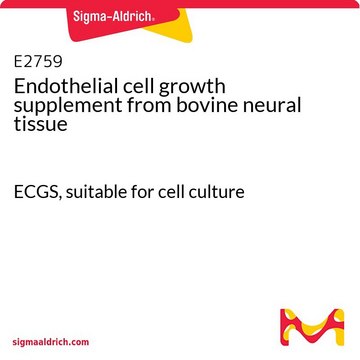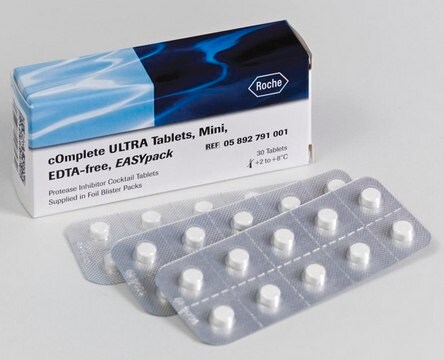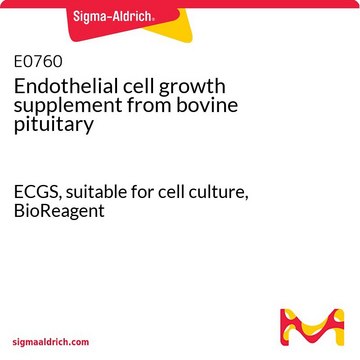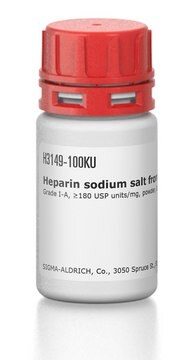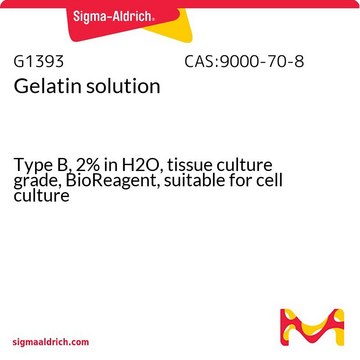02-102
Endothelial Cell Growth Supplement, 150mg
The Endothelial Cell Growth Supplement is designed for use as a cell culture media supplement. This cell growth supplement is available in a 150 mg format & has been optimized & validated for cell culture.
Synonym(s):
Primary Cell Culture Supplement
Sign Into View Organizational & Contract Pricing
All Photos(1)
About This Item
UNSPSC Code:
12352207
eCl@ss:
32160801
NACRES:
NA.81
Recommended Products
Quality Level
form
liquid
manufacturer/tradename
Millipore
Upstate®
technique(s)
cell culture | mammalian: suitable
input
sample type neural stem cell(s)
sample type epithelial cells
shipped in
dry ice
General description
ECGS is mitogenic for many types of cells under reduced or serum-free conditions, such as mammalian, avian and human endothelial cells, smooth muscle cells, keratinocytes, melanocytes and hybridomas; ECGS often fully substitutes for feeder layers in culture of fastidious cells.
Application
For use as a cell culture media supplement.
The Endothelial Cell Growth Supplement is designed for use as a cell culture media supplement. This cell growth supplement is available in a 150 mg format & has been optimized & validated for cell culture.
Quality
routinely evaluated in a 5 day growth assay of fetal bovine heart endothelial cells
Physical form
150 mg, packaged in 10 bottles, each bottle containing 15 mg of bovine hypothalamic protein extract, rich in cell growth and attachment factors, lyophilized from sterile water containing trace amounts of NaCl and streptomycin sulfate.
Storage and Stability
Lyophilized: Stable for 2 years at -20°C from date of shipment. Rehydrated: Stable for 3 months at -20°C.
Legal Information
UPSTATE is a registered trademark of Merck KGaA, Darmstadt, Germany
Disclaimer
Unless otherwise stated in our catalog or other company documentation accompanying the product(s), our products are intended for research use only and are not to be used for any other purpose, which includes but is not limited to, unauthorized commercial uses, in vitro diagnostic uses, ex vivo or in vivo therapeutic uses or any type of consumption or application to humans or animals.
Storage Class
11 - Combustible Solids
wgk_germany
WGK 2
Certificates of Analysis (COA)
Search for Certificates of Analysis (COA) by entering the products Lot/Batch Number. Lot and Batch Numbers can be found on a product’s label following the words ‘Lot’ or ‘Batch’.
Already Own This Product?
Find documentation for the products that you have recently purchased in the Document Library.
Customers Also Viewed
N A Lanson et al.
Nucleic acids research, 28(15), 2882-2892 (2000-07-25)
To investigate molecular controls of cardiomyocyte proliferation, we utilized cardiomyocytes induced to proliferate indefinitely by SV40 large T antigen (T-ag). In the T-ag-immortalized AT-1, AT-2 and HL-1 cardiomyocytes, normal cellular proteins associating with T-ag and p53 were identified, isolated and
A T Kovala et al.
FASEB journal : official publication of the Federation of American Societies for Experimental Biology, 14(15), 2486-2494 (2000-12-02)
The definition of signaling pathways in endothelial cells has been hampered by the difficulty of transiently transfecting these cells with high efficiency. This investigation was undertaken to develop an efficient technique for the transfection of endothelial cells for functional analyses.
H Hoshi et al.
In vitro cellular & developmental biology : journal of the Tissue Culture Association, 22(1), 51-56 (1986-01-01)
Endothelial cells from autopsy and biopsy specimens from a variety of adult human vascular tissue were harvested by collagenase treatment and gentle swabbing of the lumenal surface. Nutrient medium MCDB 107 containing a partially purified brain-derived growth factor (5 micrograms/ml)
S Strömblad et al.
The Journal of clinical investigation, 98(2), 426-433 (1996-07-15)
Induction of p53 activity in cells undergoing DNA synthesis represents a molecular conflict that can lead to apoptosis. During angiogenesis, proliferative endothelial cells become apoptotic in response to antagonists of integrin alphavbeta3 and this leads to the regression of angiogenic
U M Vischer et al.
Blood, 91(1), 118-127 (1998-02-07)
von Willebrand factor (vWF) is stored and released from endothelial secretory granules called Weibel-Palade (WP) bodies. Acute release can be induced by thrombin, histamine, and other mediators of thrombosis or inflammation. Their effect is thought to be mediated by an
Our team of scientists has experience in all areas of research including Life Science, Material Science, Chemical Synthesis, Chromatography, Analytical and many others.
Contact Technical Service

